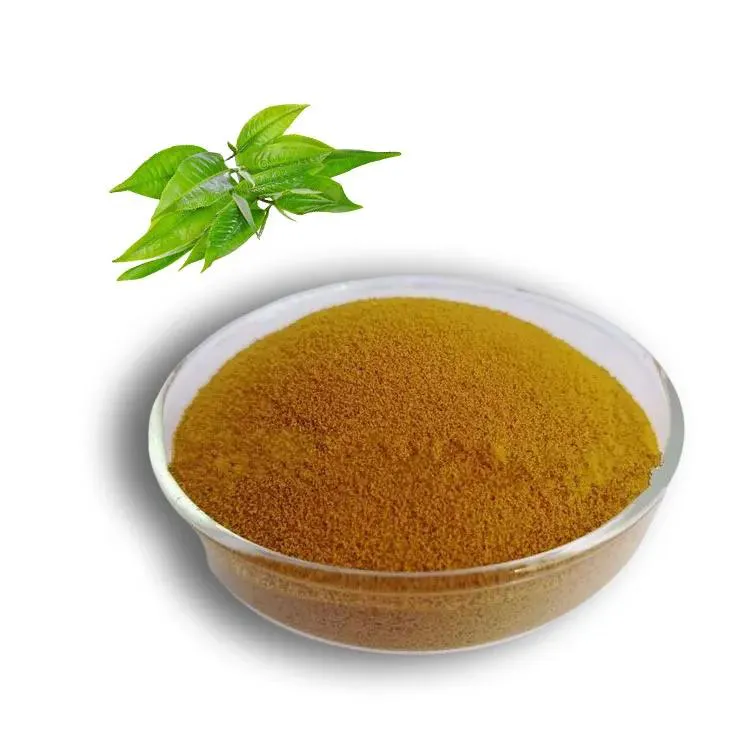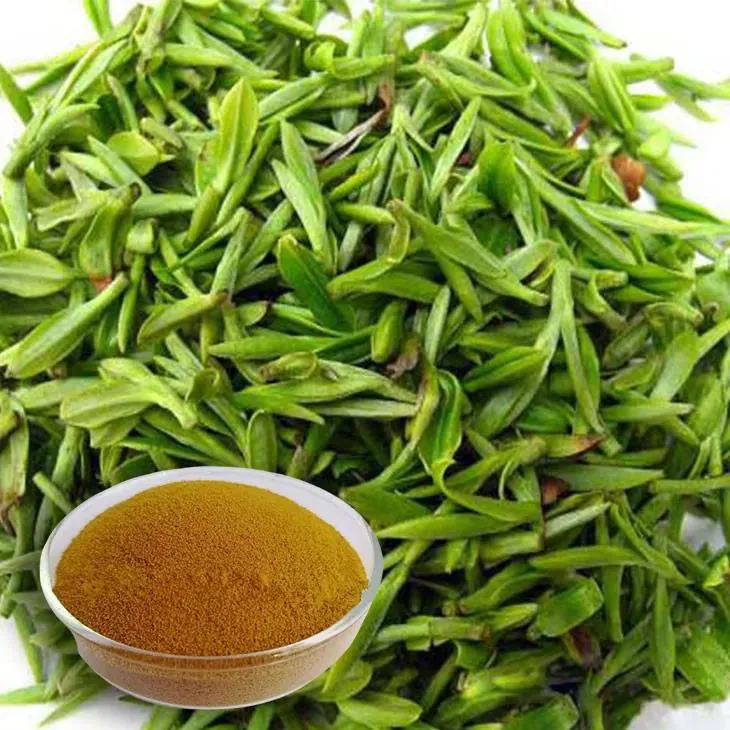- 0086-571-85302990
- sales@greenskybio.com
Understanding Private - Label Green Tea Extracts: A Comprehensive Guide
2024-12-10

1. Introduction to Green Tea Extract in Private Labels
Green tea has been a popular beverage for centuries, known for its numerous health benefits. In recent years, Green Tea Extract has emerged as a key ingredient in various products in the health and wellness industry. When it comes to private - label products, Green Tea Extract offers a unique opportunity for businesses. A private - label product is one that is manufactured by one company and sold under another company's brand. In the case of green tea extract, private labels can range from dietary supplements to skincare products.
The appeal of using green tea extract in private - label products lies in its well - known properties. It is rich in antioxidants, particularly catechins such as epigallocatechin - 3 - gallate (EGCG). These antioxidants play a crucial role in combating oxidative stress in the body, which is associated with various diseases and aging. Additionally, green tea extract has been linked to potential benefits such as improved metabolism, weight management, and skin health.

2. The Value of Green Tea Extract in Product Lines
2.1 Dietary Supplements
In the realm of dietary supplements, green tea extract can be a valuable addition. For example, it is often included in products marketed for weight loss. The catechins in green tea extract are believed to increase thermogenesis, which is the body's process of generating heat and burning calories. It can also support overall metabolic function, helping the body to process nutrients more efficiently.
Moreover, green tea extract may have cardiovascular benefits when used in dietary supplements. It has been studied for its potential to improve blood lipid profiles by reducing LDL (low - density lipoprotein) cholesterol levels and increasing HDL (high - density lipoprotein) cholesterol levels. This can contribute to a reduced risk of heart disease.
2.2 Skincare Products
Green tea extract is a sought - after ingredient in skincare due to its antioxidant and anti - inflammatory properties. Antioxidants help to protect the skin from free radical damage, which can lead to premature aging, wrinkles, and dull skin. The anti - inflammatory effects of green tea extract can soothe irritated skin and reduce redness.
It is also used in products for acne - prone skin. Green tea extract has antibacterial properties that can help to combat the bacteria that contribute to acne breakouts. Additionally, it can regulate sebum production, preventing the skin from becoming too oily.
2.3 Functional Foods and Beverages
In the world of functional foods and beverages, green tea extract can enhance the health profile of products. For instance, in energy drinks, it can provide a natural source of caffeine along with its antioxidant benefits. In green tea - flavored products, such as ice creams or yogurts, the extract can add a distinct flavor while also offering health - promoting properties.

3. Quality Factors to Consider
3.1 Source of Green Tea
The quality of green tea extract begins with the source of the green tea leaves. Green tea is grown in various regions around the world, with some areas known for producing higher - quality leaves. For example, tea from Japan and certain regions in China is highly regarded. The climate, soil conditions, and cultivation methods in these regions can influence the composition and quality of the tea leaves.
Organic green tea is also an important consideration. Organic farming practices ensure that the tea leaves are free from pesticides and other harmful chemicals. This not only benefits the environment but also results in a purer and potentially more health - promoting green tea extract.
3.2 Extraction Method
There are different methods for extracting green tea extract, and the method used can significantly affect the quality. One common method is solvent extraction, which uses solvents such as ethanol or water to extract the active compounds from the tea leaves. However, the choice of solvent and the extraction conditions need to be carefully controlled to ensure the purity and potency of the extract.
Another method is supercritical fluid extraction, which uses a supercritical fluid, usually carbon dioxide, as the extracting agent. This method has the advantage of producing a cleaner extract with fewer impurities, but it is also more expensive.
3.3 Standardization of Active Compounds
To ensure consistent quality, it is important to look for green tea extract that is standardized for its active compounds, particularly catechins. Standardization means that the extract contains a consistent amount of the key active ingredients. This allows for more accurate dosing in products and ensures that consumers receive the expected health benefits.
For example, a high - quality green tea extract for dietary supplements may be standardized to contain a specific percentage of EGCG. This helps to ensure that the product is effective and reliable.

4. Regulatory Requirements
4.1 Dietary Supplement Regulations
In the case of green tea extract used in dietary supplements, there are specific regulatory requirements in different countries. In the United States, for example, dietary supplements are regulated by the Food and Drug Administration (FDA) under the Dietary Supplement Health and Education Act (DSHEA). The manufacturer is responsible for ensuring the safety and quality of the product.
This includes proper labeling, which must include information such as the ingredient list, recommended dosage, and any potential warnings or side effects. The manufacturer may also need to provide evidence of the supplement's safety and efficacy if requested by the FDA.
4.2 Skincare Product Regulations
For skincare products containing green tea extract, regulatory requirements vary globally. In the European Union, for example, cosmetics are regulated under the Cosmetics Regulation. This requires that products be safe for consumer use, and manufacturers must ensure that the ingredients, including green tea extract, are compliant with the regulations.
Manufacturers need to conduct safety assessments and provide product information, such as the ingredient declaration and any potential allergens. In the United States, the Food, Drug, and Cosmetic Act (FD&C Act) governs skincare products, and similar requirements for safety and labeling apply.
4.3 Regulations for Functional Foods and Beverages
Functional foods and beverages with green tea extract are also subject to regulatory scrutiny. In many countries, these products need to meet food safety standards. For example, if a beverage contains green tea extract as an added ingredient, it must comply with regulations regarding food additives.
Additionally, labeling requirements for functional foods and beverages are important. The label should clearly indicate the presence of green tea extract and any associated health claims must be supported by scientific evidence.
5. Making Informed Decisions in the Competitive Market
5.1 Research and Due Diligence
In the competitive market of private - label green tea extract products, it is essential to conduct thorough research. This includes researching different suppliers of green tea extract. Look for suppliers with a good reputation for quality and reliability. Check for customer reviews and testimonials, and inquire about their manufacturing processes.
Additionally, stay updated on the latest scientific research regarding green tea extract. New studies may uncover additional health benefits or potential risks, which can impact product development and marketing.
5.2 Cost - Benefit Analysis
When considering private - label green tea extract products, a cost - benefit analysis is crucial. Compare the cost of different sources of green tea extract, taking into account the quality factors discussed earlier. A lower - cost extract may seem appealing, but if it is of inferior quality, it may not provide the desired benefits and could potentially harm your brand reputation.
Consider also the potential market demand for your product. If you are targeting a health - conscious market segment, investing in a higher - quality green tea extract may be worth the additional cost as it can attract more customers and command a higher price.
5.3 Branding and Marketing Considerations
Branding and marketing play a significant role in the success of private - label green tea extract products. Develop a strong brand identity that emphasizes the unique benefits of green tea extract. For example, if your product is a dietary supplement, focus on the weight - loss or health - promoting aspects of green tea extract.
Use effective marketing strategies such as social media marketing, influencer partnerships, and product demonstrations. Highlight the quality and purity of your green tea extract, and differentiate your product from competitors in the market.
FAQ:
What are the main benefits of private - label green tea extracts?
Private - label green tea extracts offer several benefits. Green tea is rich in antioxidants such as catechins, which can have potential health - promoting effects. For a product line, it can attract health - conscious consumers. It may also have properties that support weight management, and its antioxidant content can contribute to skin health, making it a versatile addition to various product categories like dietary supplements, skincare, and functional beverages.
How can one ensure the quality of private - label green tea extracts?
To ensure the quality of private - label green tea extracts, look for several factors. Firstly, the source of the green tea is crucial. High - quality tea leaves from reputable regions tend to produce better extracts. Check for certifications such as organic certifications if relevant. Analyze the extraction process - a proper extraction method should be used to preserve the active compounds. Laboratory testing for purity, potency, and absence of contaminants like heavy metals and pesticides is also essential. Additionally, the manufacturing facility should follow good manufacturing practices (GMP) to ensure consistent quality.
What are the regulatory requirements for private - label green tea extracts?
The regulatory requirements for private - label green tea extracts vary by country and region. In general, for dietary supplements, there may be regulations regarding labeling, which should accurately disclose the ingredients, dosage, and any potential health claims. There could be restrictions on certain additives or preservatives. In the case of using green tea extracts in food or beverages, food safety regulations apply. For example, maximum residue limits for pesticides may be set. In some areas, registration or approval may be required for products containing green tea extracts, especially if they are marketed as having specific health benefits.
How can private - label green tea extracts be incorporated into different product lines?
Private - label green tea extracts can be incorporated into different product lines in multiple ways. In the dietary supplement industry, it can be formulated as capsules, tablets, or powders. For skincare products, it can be added to creams, lotions, and serums due to its antioxidant properties that may help in protecting the skin from environmental damage. In the beverage industry, it can be used to create green tea - flavored drinks or added to existing beverage formulas for an added health boost. It can also be included in functional foods such as energy bars or breakfast cereals.
What are the market trends related to private - label green tea extracts?
Currently, there is an increasing trend towards natural and functional ingredients in the market, which benefits private - label green tea extracts. Consumers are more interested in products with health - promoting properties, and green tea extracts fit this demand well. There is also a growing demand for private - label products in general as they offer cost - effective and customizable options for businesses. Additionally, the trend towards clean - label products means that simple and recognizable ingredients like green tea extracts are becoming more popular.
Related literature
- Green Tea Extract: Chemistry, Antioxidant Properties and Applications in Cosmetics"
- "The Health Benefits of Green Tea: An Evidence - Based Review"
- "Regulatory Aspects of Dietary Supplements Containing Green Tea Extract"
- ▶ Hesperidin
- ▶ Citrus Bioflavonoids
- ▶ Plant Extract
- ▶ lycopene
- ▶ Diosmin
- ▶ Grape seed extract
- ▶ Sea buckthorn Juice Powder
- ▶ Fruit Juice Powder
- ▶ Hops Extract
- ▶ Artichoke Extract
- ▶ Mushroom extract
- ▶ Astaxanthin
- ▶ Green Tea Extract
- ▶ Curcumin
- ▶ Horse Chestnut Extract
- ▶ Other Product
- ▶ Boswellia Serrata Extract
- ▶ Resveratrol
- ▶ Marigold Extract
- ▶ Grape Leaf Extract
- ▶ New Product
- ▶ Aminolevulinic acid
- ▶ Cranberry Extract
- ▶ Red Yeast Rice
- ▶ Red Wine Extract
-
Aminolevulinic acid
2024-12-10
-
Lemon Balm Extract
2024-12-10
-
Red Vine Extract
2024-12-10
-
Rosemary extract
2024-12-10
-
Honeysuckle Pollen
2024-12-10
-
Tormentil Extract
2024-12-10
-
Pine bark Extract Powder
2024-12-10
-
Passionflower Extract
2024-12-10
-
Konjac Powder
2024-12-10
-
Alfalfa Meal
2024-12-10





















